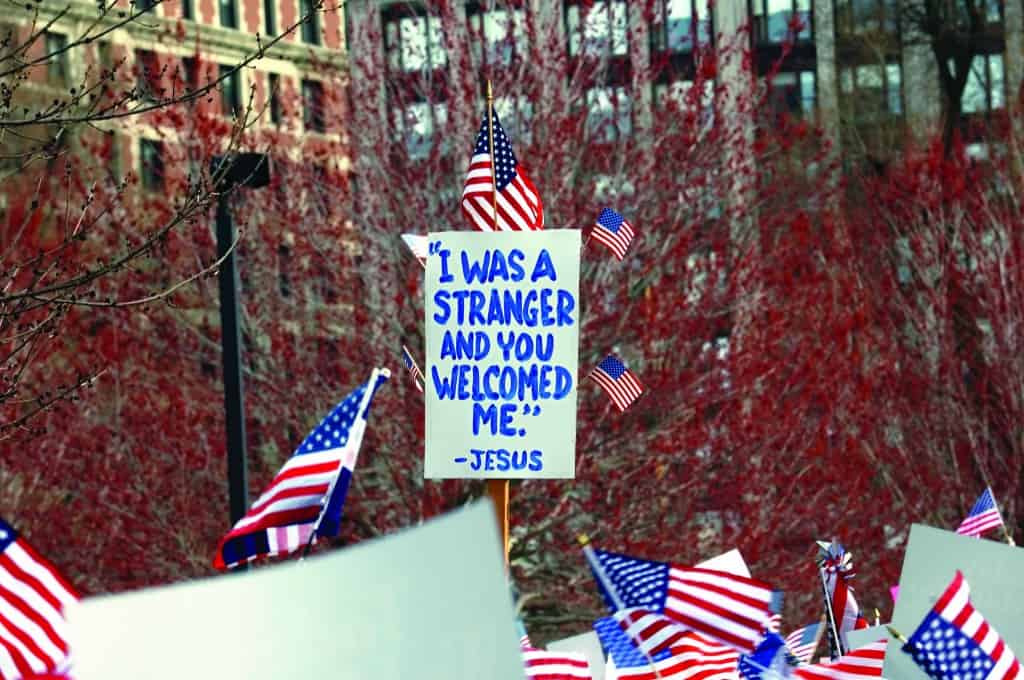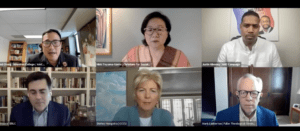 The issues surrounding the immigration debate are complex and ongoing. The United States was founded by immigrants, and many can point to ancestors from Europe, Asia, or Africa who reached these shores in the last 250 years. What about today? How is the country responding to the arrival of newcomers in such large numbers? The presence of millions of immigrants is raising issues at all levels of national life. It affects the public school system, healthcare providers, law enforcement, and the economy. There is a fear that what many consider to be the country’s cultural makeup will change beyond recognition. With the emergence, for example, of Spanish-language media and with entire neighborhoods taking on a different look, some Americans feel disoriented and suspect that their way of life is being endangered. The challenges are even more daunting once international migration becomes part of the discussion. Around the globe tens of millions are on the move, looking for work and a new start to life.
The issues surrounding the immigration debate are complex and ongoing. The United States was founded by immigrants, and many can point to ancestors from Europe, Asia, or Africa who reached these shores in the last 250 years. What about today? How is the country responding to the arrival of newcomers in such large numbers? The presence of millions of immigrants is raising issues at all levels of national life. It affects the public school system, healthcare providers, law enforcement, and the economy. There is a fear that what many consider to be the country’s cultural makeup will change beyond recognition. With the emergence, for example, of Spanish-language media and with entire neighborhoods taking on a different look, some Americans feel disoriented and suspect that their way of life is being endangered. The challenges are even more daunting once international migration becomes part of the discussion. Around the globe tens of millions are on the move, looking for work and a new start to life.
What is a Christian to think? My experience has been that most Christians’ view of immigration/immigrants is more reflective of their political affiliation, personal experience, or hearsay than it is informed by their faith. They have not considered what the Bible may have to say about the migration of people. If, however, we claim that the Bible, as the church’s Scripture, is our authoritative guide for life, then that is precisely where an explicitly Christian outlook must be grounded. In fact, as it turns out, the Bible has quite a bit to say about migration matters.
Most Christians’ view of immigration/immigrants is more reflective of their political affiliation,
personal experience, or hearsay than it is informed by their faith.
Immigration is about people, and the Bible emphatically affirms that people have value in the sight of God. Genesis 1:26-28 states that all human beings are made in the image of God. This passage makes clear that humans have a mind, will, emotions, and a spiritual side; all of us can share in the rule of God as his servants. Each person including the immigrant has worth and the unique potential to contribute to society and the common good. This is where discussions on immigration must start. Appreciating newcomers as made in the image of God would eliminate the heated rhetoric and unfortunate labeling that is widespread in the media. It would motivate those who claim to be Christians to treat immigrants with dignity, respect, and kindness. The fact that millions of those who have arrived in this country are Christians and part of the family of God underscores even more the necessity of looking at these people differently than do many in the majority culture.
Migration and the people of God
The Bible is full of accounts about people on the move. In fact, the Bible in large measure can be read as a book about migrants written by those who experienced migration firsthand or were part of communities that had been shaped by a history of migration.
Humanity has migrated since the beginning of history. According to Genesis, Adam and Eve and Cain were the first to wander (Genesis 3:23-4:16). The story of the chosen people starts with Abram’s pilgrimage to an unknown land (Genesis 11:31-12:5; 23:4; cf. Deuteronomy 26:5). Over the following centuries his descendants left their homes for reasons of hunger, war, forced exile, and natural disasters—the very same reasons that drive individuals and their families to migrate today.
Abram’s and Jacob’s families went to Egypt because of famine (Genesis 12 and Genesis 42-43), while Isaac moved into Philistine territory (Genesis 26). Naomi and her family left Bethlehem in Judah because food was scarce and crossed over into Moab. Her sons married Moabite women, one of whom was Ruth, but in time Naomi’s husband and sons died. When Naomi, the immigrant, opted to return home, Ruth went with her and now she became the immigrant. Her sterling character attracted Boaz, who took her as his wife, and their son Obed would be the grandfather of David and forefather of Jesus (Matthew 1:5). What a fascinating and multi-layered immigration story!
Others were forcefully removed from their homes. Joseph was sold into slavery, but he rose to become second to Pharaoh in Egypt and saved the nation from starvation (Genesis 37-41). He also paved the way for Jacob and his brothers’ families to migrate to the Nile Delta and settle in Goshen (Genesis 47). Years later, thousands were taken into exile when Israel fell to Assyria (2 Kings 17) and Judah to Babylon (2 Kings 24-25).
Life in foreign lands could be difficult. The Israelites in Egypt suffered as slaves. In Assyria some exiles became domestic servants, while others had to work on farms or in construction. Psalm 137 reproduces the frustration and homesickness of those who had been taken from Judah by Babylon. Not everyone, however, endured humiliation and affliction. Joseph rose to prominence in Egypt. Daniel distinguished himself under several kings in Babylon. Esther’s uncle Mordechai must have achieved some success in Susa, while she became queen of the Persian Empire. Nehemiah was cupbearer to Artaxerxes, and Ezra and Ezekiel apparently ministered freely among the exiles.
Migration also involves the interaction between peoples, between those who have arrived and those who receive them. Each of these Old Testament accounts is a window into levels of assimilation. Some individuals acculturate to significant degrees. Joseph married an Egyptian and had children by her. He appears so Egyptian that his brothers do not recognize him, but Joseph had not forgotten his mother tongue. He understands what they are saying. He had Jacob’s body embalmed according to Egyptian custom (Genesis 41-45), as would his body be at his death (Genesis 50). In a letter Jeremiah counsels the exiles to invest in their surroundings, even though they were to maintain their faith and other differences (Jeremiah 29). Esther, Ezra, and Nehemiah were born in exile. Esther never thinks about leaving and must be coached by her relative about saving her people. Nehemiah leaves the Persian court for a time to rebuild the walls of Jerusalem but then goes back to serve his king. They are quite the contrast to Ezra, a priest, who leads a group back to Judah to resettle their ancestral land.
These narratives also reveal a gamut of responses to the presence of strangers. The Egyptians felt threatened by the growing number of Israelites and tried infanticide to halt it. Haman sought to eliminate the entire Jewish population, because he felt slighted by just one. Abimelech feels betrayed by Abram and sends him away (Genesis 12:10-20; cf. 26:6-11), while Ruth, Daniel, and Nehemiah are deeply appreciated by the host culture.
Migration and Old Testament law
A good number of passages in the law deal with sojourners. At this point, it is helpful to consider the vocabulary of the Old Testament in regards to outsiders. In Hebrew there are several words that are used, which indicates that the Israelites evaluated the foreigners in their midst. Some terms are negative; these outsiders are viewed as a corrupting influence or even as enemies (nekar/nokrî; zar). The label ger, on the other hand, refers to those who moved in and became a part of Israelite life. The law contained many provisions to help them become a part of the community. People from other backgrounds had been part of their history since Egypt (Exodus 12:38).
Concern for the sojourner makes sense against the background of ancient realities. In that agrarian peasant world, most people lived in villages and small towns. These often were composed of extended families, so kin were available for support in times of need. Outsiders had no such safety net and encouragement. This situation also meant that they were excluded from the land tenure system, where property was passed down from father to son. Therefore, they were dependent on the Israelites for work, sustenance, and protection.
The law took this precarious situation into account and offered several measures to counterbalance sojourners’ deficits. These workers were to be granted rest (Exodus 20:10; Deuteronomy 5:14) and paid a fare and timely wage (Deuteronomy 24:14-15). There were provisions for food (Deuteronomy 14:28-29; 24:19-21) and the demand for impartial dealings in the law courts (Deuteronomy 1:16-17; 24:17-18). These outsiders also were invited to participate in several of the religious feasts. This is significant, because faithful observance was at the core of Israel’s cultural identity, and this would require that the foreigner learn the ways and language of Israel. The prophets denounced those who mistreated the sojourner (Jeremiah 7:5-7; 22:2-5; Malachi 3:5) and looked to the day when their incorporation into national life would be even greater (Ezekiel 47:21-23; cf. Isaiah 56:1-8).
Jesus’ care for the marginalized is clear. The greatest illustration of his unbounded love is his treatment of the Samaritans, a people despised by the Jews. His is an upside-down kingdom, where those whom the world rejects are the very ones he embraces. He himself was the ultimate outsider, who migrated from heaven to give his life for all.
Why was Israel to be compassionate and open to the sojourner? The law gives two reasons. First, Israel was to remember that they had once been mistreated as foreigners in Egypt (Exodus 23:9; Leviticus 19:33-34). Their experience as immigrants was a key component of who they were, and that past reality was to inform their attitudes and behavior toward outsiders in the present. More importantly, they were to love the sojourner, because God did (Deuteronomy 10:17-19).
Light from the New Testament
The New Testament tells us that Jesus and his parents were refugees. They fled Bethlehem to escape Herod’s tirade and lived in Egypt. They eventually returned and settled in Nazareth (Matthew 2). In his first epistle Peter addresses the Christians as “aliens” and “strangers” (1:1; 2:11). These believers may have been exiles from elsewhere in the Roman Empire.
In Matthew 25 Jesus speaks about the final judgment. He connects this to the treatment of the stranger (vv. 35, 38, 43-44). The term he uses is xenos, from which we derive “xenophobia.” Xenos and its verbal root can refer to something that is alien and not welcome (e.g., Acts 17:20; Hebrews 13:9). It occurs with other words for stranger in Ephesians 2:19 (paroikos) and Hebrews 11:3 (parepidemos). Many appeal to Jesus’ words to defend the rights of immigrants, and what he describes fits what many endure. The issue is that “the least of these” and “brothers” (vv. 40, 45) in the Gospel of Matthew appear to point to Jesus’ disciples (10:42; 12:48f.; 18:6, 10, 14; 28:10). If that is correct, the “strangers” are those who suffer for his sake at the hands of others. Of course, many immigrants are Christians, but to apply the passage to all immigrants may be stretching its original meaning. Yet, Jesus’ care for the marginalized is clear—women, children, the sick, and the sinners. The greatest illustration of his unbounded love is his treatment of the Samaritans, a people despised by the Jews (Luke 10:30-37; 17:11-19; John 4). His is an upside-down kingdom, where those whom the world rejects are the very ones he embraces. He himself was the ultimate outsider, who migrated from heaven to give his life for all (John 1:10-12; Philippians 2:5-11), from Galilee to the cross in Jerusalem (John 1:46; 7:40-52).
The church that would arise would be multiethnic, with believers from various places of origin (Acts 13:1). Christians are to be gracious to others (Romans 12:13; Hebrews 13:2; 1 Peter 4:9), and this virtue should distinguish the leadership of the church (1 Timothy 3:2; Titus 1:8). The epistles reveal that all Christians are sojourners whose citizenship is else – where (Philippians 3:20; Hebrews 13:14) —all the more reason to extend a hand to those without citizenship on earth.
Clearly, the Bible has a lot to say about immigration! The truth of the image of God, the multiple narratives of displaced people, the provisions of the law, the work of Jesus, and the teaching of the epistles all emphasize that we must embrace the outsider. May the Scripture shape the values and perspectives of Christians as they engage the national debate and try to be a constructive voice for the good of all.
The son of a Guatemalan mother and an American father, M. Daniel Carroll Rodas is distinguished professor of Old Testament at Denver Seminary. He is the author of Christians at the Border: Immigration, the Church, and the Bible (Baker Academic, 2008). It has been translated into Spanish: Cristianos en la frontera: LaInmigración, la Iglesia, y la Biblia (Casa Creación, 2009).


